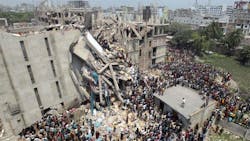18 Stand Trial over Bangladesh Factory Disaster in 2013
A Bangladesh court on June 14 ordered 18 people stand trial for the collapse of a garment factory three years ago that killed more than 1,100 people, a prosecutor said.
A senior magistrate issued the order against the 18 charged with breaching building laws in the lead up to the Rana Plaza compound's implosion in 2013, one of the world's worst industrial disasters.
No one has yet been convicted over the tragedy which highlighted appalling safety in Bangladesh's $27 billion garment export industry, the world's second largest after China.
Thirteen of the accused, including owners of the building and those of factories housed inside, appeared in court to seek their release from jail, saying they were not guilty.
"The judge rejected their discharge pleas and ordered their trial. The hearings will now begin on August 23," prosecutor Anwarul Kabir told AFP, adding that five others still on the run also face trial on the same date.
All 18 face seven years in jail if convicted of the charges.
The court has heard how the Rana Plaza owners allegedly violated building codes and illegally extended the nine-storey complex which was initially approved as a six-storey shopping mall.
Oner Sohel Rana, who has been in jail since 2013, and others also face separate murder and corruption trials over the disaster, although neither hearings have started yet.
History of Event
Rana became Bangladesh's public enemy number one in 2013 after survivors recounted how they were forced to start work despite complaints of cracks appearing in the walls the previous day.
Rana's parents, who jointly owned the building with him, and the mayor of the town of Savar where it was located, are also charged with breaching building laws.
The mayor and other officials are accused of falsifying documents to approve the extensions, while factory owners are charged with illegally installing heavy equipment including generators in the building.
At least 1,138 people are known to have died in the tragedy. Rescue workers struggled for weeks to retrieve the bodies from the ruins but some people are still unaccounted for.
The disaster triggered demands for Western retailers to help introduce sweeping reforms including new safety inspections and higher wages in the industry, which employs around four million workers.
A host of Western retailers had clothing made at the factories housed at Rana Plaza, including Italy's Benetton, Spain's Mango and the British low-cost chain Primark.
Copyright Agence France-Presse, 2016
About the Author
Agence France-Presse
Copyright Agence France-Presse, 2002-2025. AFP text, photos, graphics and logos shall not be reproduced, published, broadcast, rewritten for broadcast or publication or redistributed directly or indirectly in any medium. AFP shall not be held liable for any delays, inaccuracies, errors or omissions in any AFP content, or for any actions taken in consequence.
